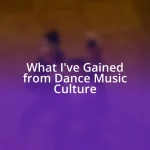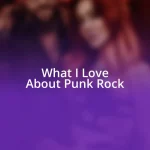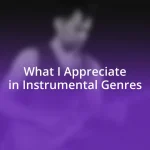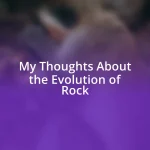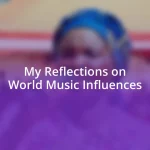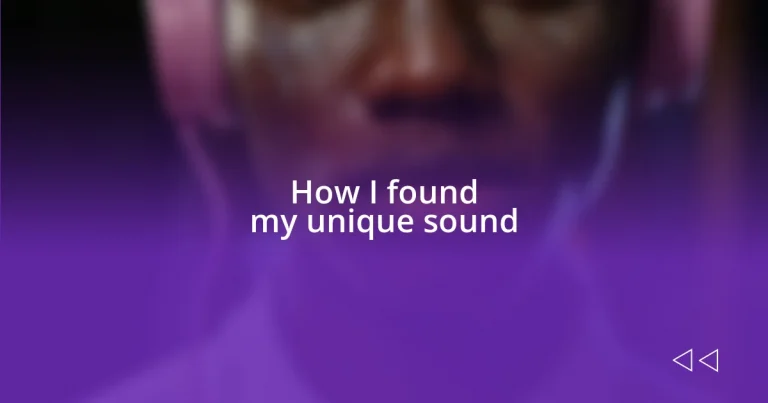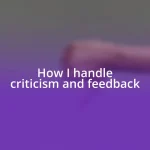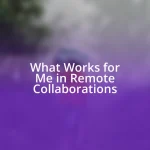Key takeaways:
- Understanding musical influences is crucial for shaping an artist’s unique sound, achieved through exploring various genres and personal connections with music.
- Experimenting with songwriting techniques, such as structured formats and collaboration, can enhance creativity and lead to unexpected musical outcomes.
- Networking with other musicians fosters community support, inspires new ideas, and encourages musical growth, ultimately aiding in the discovery of one’s unique sound.
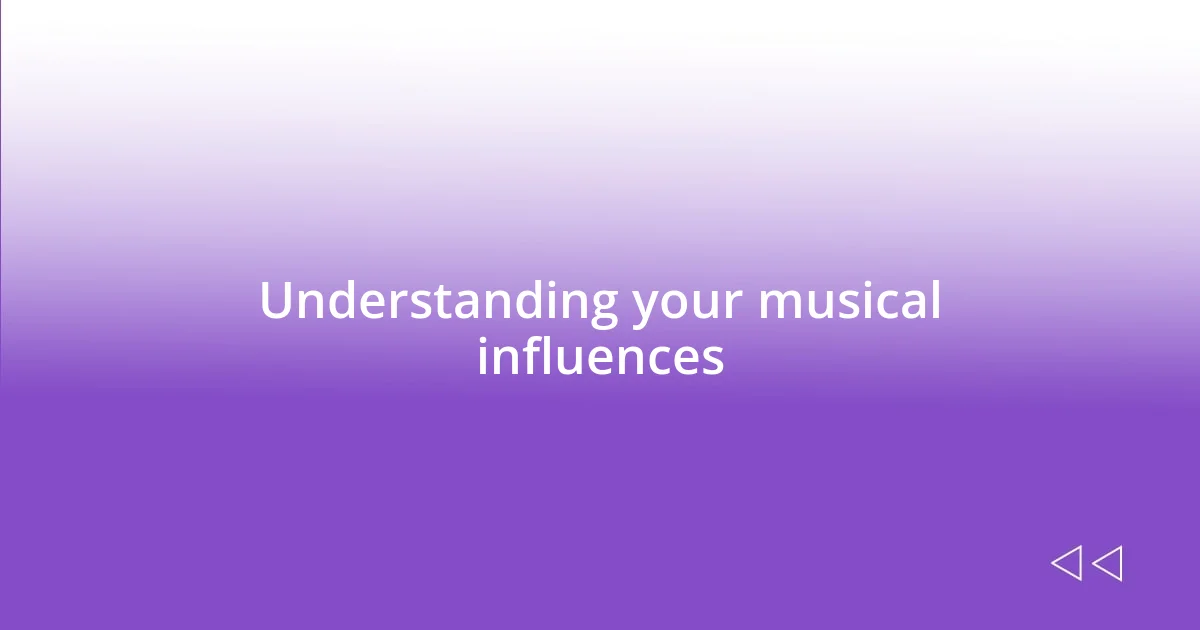
Understanding your musical influences
Understanding your musical influences is like peeling back layers of an onion; each layer reveals more about who you are as an artist. I remember listening to my dad’s classic rock vinyls as a kid, feeling the raw emotion in every guitar solo. It didn’t just shape my taste—it ignited a spark in me that I still feel when performing.
As I started to explore different genres, I found that certain artists resonated with my emotions more than others. For example, discovering indie folk music felt like finding a friend who understood my heartaches and joys. Have you ever had that moment when a song captures exactly what you’re feeling? It’s these personal connections that help you piece together your unique sound.
When I began to blend various influences, I realized how they shaped my voice as an artist. I often wondered, what if I took the intricate storytelling from folk and mixed it with the upbeat energy of pop? This experimentation led me to unexpected musical combinations that truly felt like me, illustrating how essential it is to embrace your influences while forging your own path.
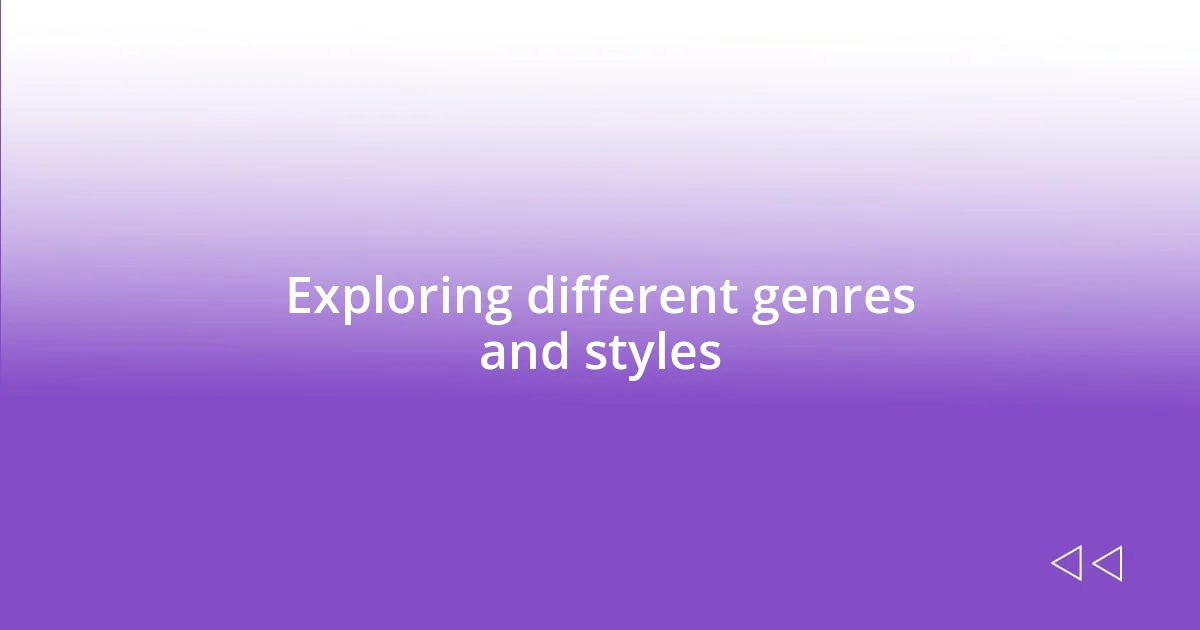
Exploring different genres and styles
Exploring different genres opened a whole new world of sounds for me. I vividly recall the first time I attended a jazz concert. The improvisation and fluidity mesmerized me, and I couldn’t help but wonder how I could weave those spontaneous elements into my own music. That moment sparked a journey where I dove into everything from classical to reggae, each genre adding a unique brushstroke to my musical canvas.
- Immerse yourself: Attend live shows across different genres to feel their energy firsthand.
- Study the greats: Listen to iconic artists in various styles to understand their approach.
- Experiment with fusion: Try blending genres you love; you might discover new sounds that truly represent you.
- Reflect on the emotions: Think about which genres resonate with your personal experiences—let that guide your sound exploration.
- Create playlists: Curate collections of songs from different styles to identify patterns and motifs that inspire you.
I encourage you to be brave while exploring! Each style can unlock different aspects of your creativity.
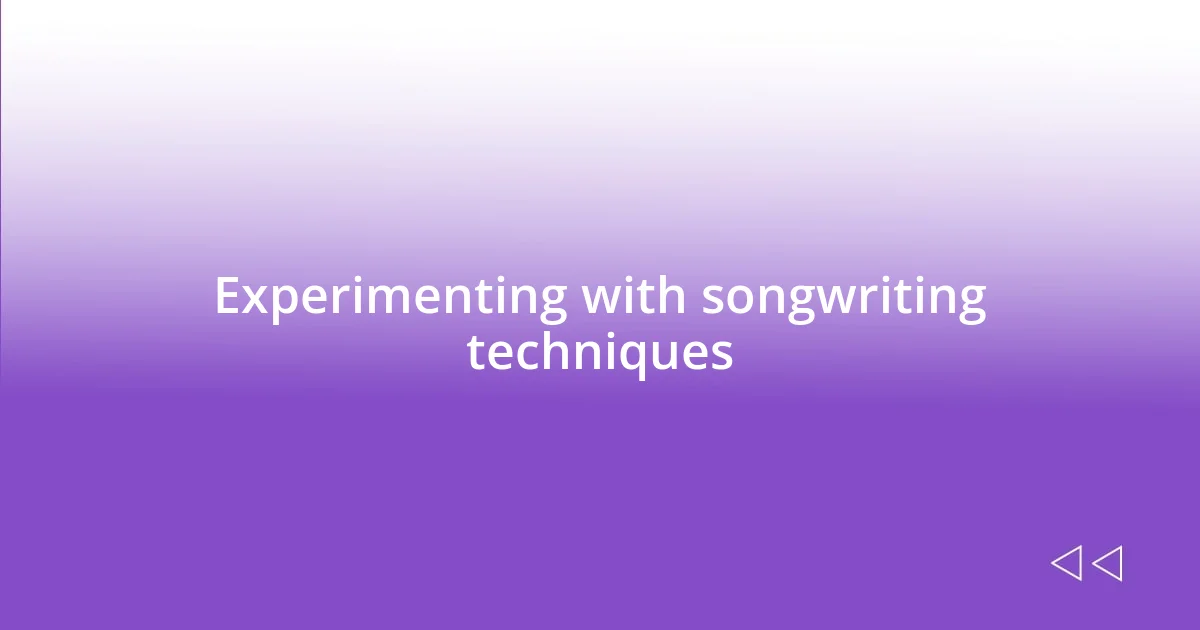
Experimenting with songwriting techniques
Experimenting with songwriting techniques has been a game-changer for my creative process. I remember the first time I decided to write a song entirely in a structured format, like AABA, instead of my typical freeform approach. It felt challenging at first, but once I found my rhythm within those boundaries, it opened up new avenues for melody and lyric development that I hadn’t explored before.
I’ve also dabbled with different songwriting prompts, which have significantly enhanced my creative flow. One day, I set a timer for 15 minutes and wrote down every word that came to my mind about a particular theme. The result was a raw piece full of emotion that I could refine later. Have you tried using prompts? They can act as a spark, igniting creativity when you’re feeling stuck.
When I began co-writing with a friend who had a completely different approach, the synergy was electrifying. I would typically focus on the lyrics first, but she encouraged me to start with the melody. This shift in perspective did wonders for my songwriting. The magic happened when we combined both of our methods, resulting in songs that felt fresh and authentic. Remember, collaboration doesn’t just diversify your sound; it can redefine what you consider “your sound.”
| Songwriting Technique | Description |
|---|---|
| Structured Formats | Using specific song structures to guide melody and lyrics, enhancing creativity. |
| Writing Prompts | Engaging in timed freewriting to generate raw ideas quickly, which can be polished later. |
| Collaboration | Working with other songwriters to blend styles and techniques, leading to unexpected musical outcomes. |
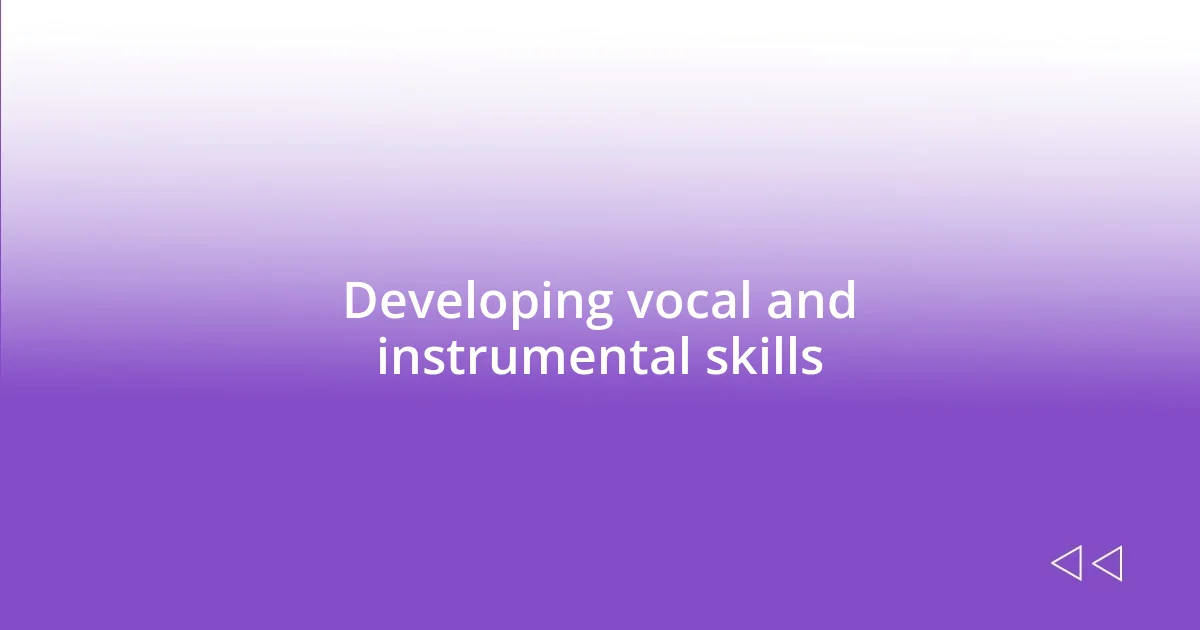
Developing vocal and instrumental skills
Developing my vocal and instrumental skills has been an essential part of finding my unique sound. I remember taking voice lessons for the first time and being terrified of hitting high notes. But with consistent practice and vocal exercises, I began to enjoy the feeling of my voice expanding. Have you ever pushed through a challenge only to discover a new part of yourself? That’s what I felt when I finally hit that high C effortlessly in a recent session.
On the instrumental side, I took it upon myself to learn guitar beyond just basic chords. One afternoon, I sat in my living room with a tutorial video, and within hours, I could strum along to my favorite songs. That little victory motivated me to explore fingerpicking techniques, which added a delicate vibe to my arrangements. It felt amazing to unlock new skills and realize the potential they had for enriching my music.
I believe that creating a dedicated practice routine is crucial for skill development. When I set aside time each day to focus on scales and exercises, I noticed a significant shift in my abilities. The more I invested in my skills, the clearer my artistic voice became. How do you approach your practice? Making it part of your daily life can enhance not only your technical abilities but also your connection to the music you love.
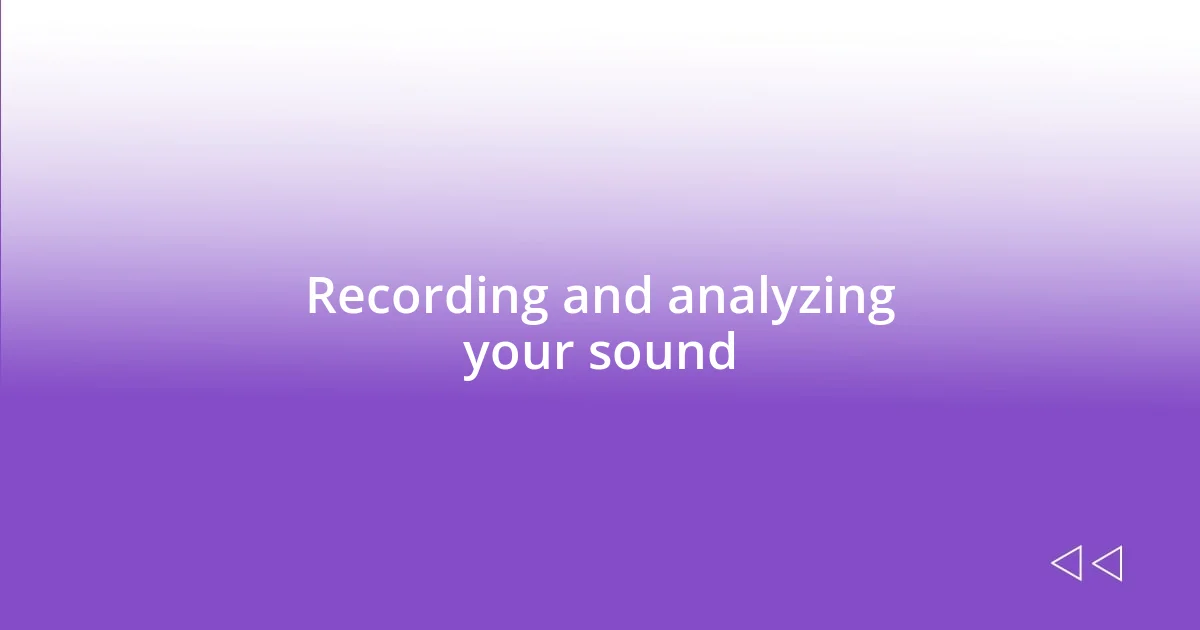
Recording and analyzing your sound
Recording my sound was an enlightening journey that opened my eyes to the nuances of my music. I remember the first time I set up my home studio. I thought it would be a simple process, but capturing the essence of what I created was more challenging than I anticipated. Each time I hit record, I learned how subtle changes in dynamics or tone could dramatically alter the feel of a track. Have you ever listened to a live recording of your work? Hearing your sound played back reveals layers you might not notice in the moment.
Analyzing those recordings became a ritual for me. I started using software to visualize sound waves and frequencies, which was like exploring a whole new world. By seeing the peaks and valleys, I could identify areas where I needed more energy or focus. One time, I noticed that a particular harmony I had thought was weak actually had a powerful emotional pull when I looked at the waveforms. Discovering that was a lightbulb moment! How often do we rely solely on our intuition without digging deeper?
It’s all about feedback too. After I recorded a rough demo and shared it with trusted friends, their insights helped shape my sound even further. Their observations about certain riffs or lyrics that resonated with them made me realize I wasn’t just crafting music in isolation—my sound was evolving with the help of my community. This collaborative process taught me that analyzing my music is vital; it’s about more than just notes and chords—it’s about connection and growth. How do you seek feedback on your music? Sometimes, the perspective from someone else can shine a light on possibilities you haven’t yet imagined.
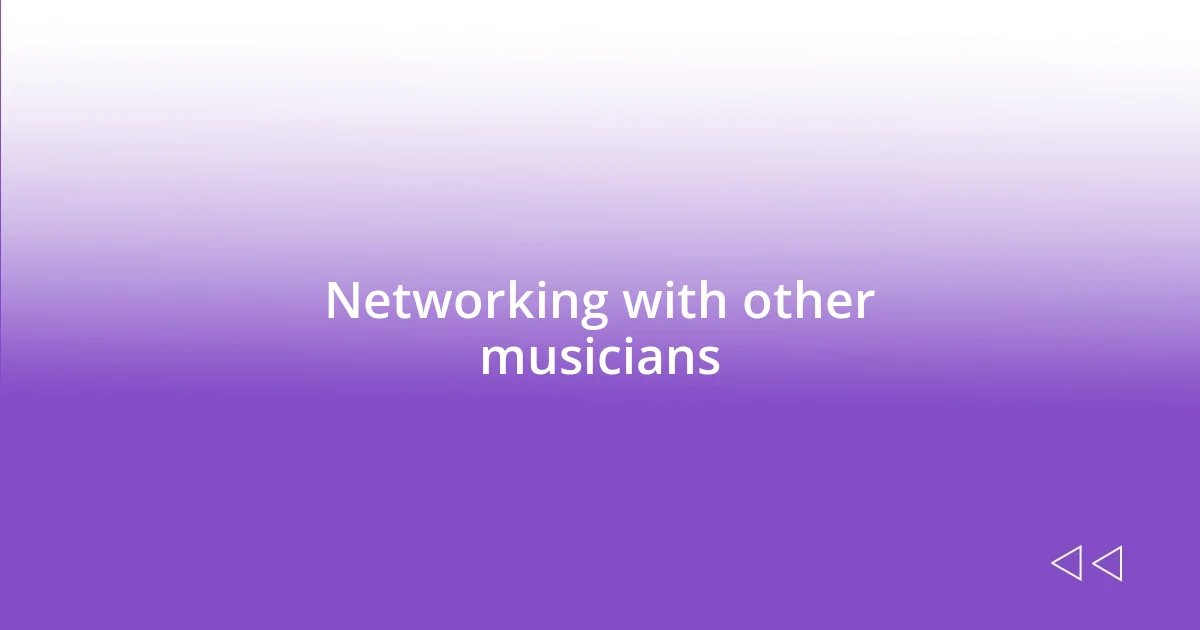
Networking with other musicians
Building relationships with other musicians has been one of the most rewarding experiences in my musical journey. I recall a night spent at a local open mic where I met a guitarist who played with such passion that it ignited something within me. We exchanged contacts and soon found ourselves collaborating on a song, which brought a fresh perspective to my sound. Isn’t it amazing how one connection can lead to new ideas and inspiration?
Networking isn’t just about exchanging social media handles; it’s about creating a supportive community. I once attended a workshop where musicians shared their struggles and triumphs. Listening to their stories made me feel less isolated in my own journey. I started reaching out more frequently after that, whether through group chats or jam sessions, realizing that sharing music with others often uncovers hidden talents and insights in my work. Have you ever experienced that electric feeling when you play together with someone?
Every interaction holds the potential for growth. A few months ago, I sat with a friend who played a different genre, and we spent hours blending our styles. I was amazed at how our musical backgrounds complemented one another. It made me rethink my own approach. How often do you step outside your comfort zone to collaborate? I believe these moments not only broaden our musical horizons but also pave the way to discovering our own unique sound—even in the least expected places.



